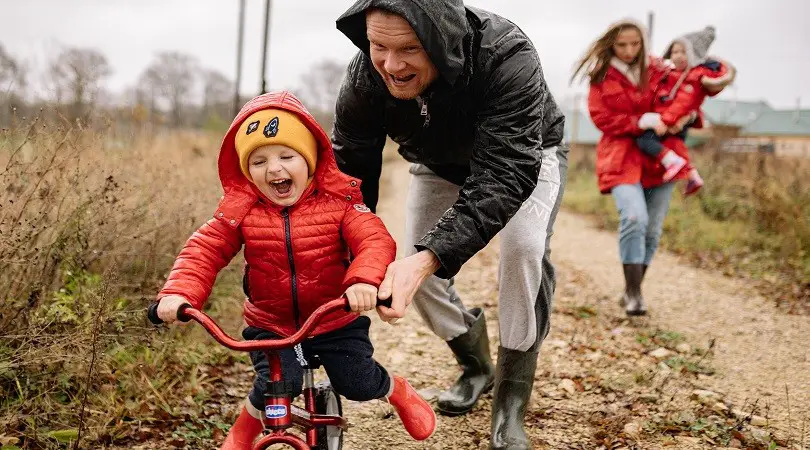Last Updated on January 6, 2025
Every mom or dad, no matter where they come from or what they’ve been through, hopes to give their kids a world filled with love and safety. Just like any adventure, parenting has its high points, tricky spots, and unforgettable moments.
And, just like any adventurer, parents sometimes need a bit of guidance on their journey. This article explores some tips and tricks to make the parenting adventure a bit smoother and help set your kids on the right path for their bright futures.
Active Listening is Key
When you actively listen, you fully concentrate on what your child is saying without letting your thoughts drift or immediately formulating a response. It’s more than just hearing words; it’s about understanding the emotions and intentions behind them.
Children, like adults, want to be heard and understood. Giving them your undivided attention sends the message that they are important to you. Moreover, active listening helps you catch subtle cues and underlying concerns that might be missed otherwise.
It fosters trust, open communication, and strengthens the parent-child bond. After all, if we truly listen today, we’ll be better equipped to guide and support them tomorrow.
Addressing Personal Trauma
Your past experiences, especially traumatic ones, can affect your current behavior. If left unresolved, past trauma can lead to unintended reactions or patterns that might affect your children negatively.
For example, someone with unresolved issues might find it hard to trust, leading to overprotectiveness or unnecessary anxiety about a child’s well-being. Therapy or counseling can help individuals deal with these traumas and develop coping strategies.
Understanding and working on your own issues can create a healthier and more nurturing environment for your children. It’s like healing your own wounds so you can care better for others. Remember, being the best parent starts with looking after your own well-being.
Encourage Independence
Every mom or dad knows the urge to protect their children from life’s hurdles. Yet, it’s essential for kids to sometimes address challenges head-on. This might involve picking out clothes for the day, taking charge of a school task, or sorting out a small disagreement with a friend.
By tackling such tasks, kids build self-assurance and pick up crucial skills, such as problem-solving and decision-making. It’s a vital step in helping them become self-reliant and resilient individuals. While parents are always around for advice and help, giving kids space to handle things boosts their growth.

Prioritize Quality Time
The quality of your interactions with your kids matters. When you are fully attentive to your child and not distracted by work, phones, or other activities, you spend quality time with them.
It could be as simple as chatting over dinner, playing a board game, or walking together. These moments are not just ordinary; they can actually have deep effects.
They help strengthen the relationship, encourage mutual respect, and create memories that will last forever. Moreover, children often open up about their feelings, concerns, or even dreams during these moments.
Practice Patience and Understanding
There are moments when life seems too much. And during these times, it’s easy to lose your temper, especially when your child tests your patience. Remembering they’re still figuring out their feelings, making sense of the world, and understanding boundaries is important.
Rather than responding with anger to their actions, pause for a moment. Take a deep breath and consider what they might be feeling. Could they be hungry, tired, or just overwhelmed?
By staying calm and showing understanding, you teach your children a valuable lesson in managing their own emotions. This provides a safe space where they feel comfortable to share their thoughts, confident that they’ll be listened to even when things get tough.
Setting Boundaries with Consistency
When growing up, especially, children look for a framework to understand their surroundings. This is where boundaries play an important role. Children learn what’s expected of them by setting clear rules and guidelines. It gives them a sense of security, knowing there are defined limits.
Setting a boundary is just the first step. Maintaining it consistently is where the real work lies. If rules change frequently or aren’t enforced, it can lead to confusion or a feeling of instability for the child.
Consistency in upholding these boundaries reassures children, teaching them responsibility and consequences in the process. It’s about striking a balance, ensuring safety, promoting good behavior, and allowing them room to grow.
Educate on Emotional Intelligence
Emotional intelligence is all about understanding and handling our feelings and the feelings of people around us. It helps teach kids to name their emotions, whether they’re feeling happy, sad, or upset.
When kids can talk about how they feel, they manage things better. It’s not just about their own feelings either. It’s showing them how to understand what someone else might be feeling.
This kind of understanding makes them better at making friends and decisions. It helps them know themselves better and get along with others. It’s a skill that really helps in life.
Model Respectful Behavior
This method emphasizes the powerful role of leading by example in parenting. Children often look to their parents as their primary role models, absorbing behaviors, attitudes, and reactions from them.
If you want your children to treat others with kindness, understanding, and respect, you first need to show them how it’s done. This means being mindful of how you interact with others, whether it’s family, friends, or strangers.
It’s in the daily interactions, like listening attentively when someone speaks or saying “please” and “thank you,” that children learn the most. Demonstrating respect also involves acknowledging mistakes and apologizing when necessary.
Stay Informed and Updated
Parenting isn’t what it used to be. The world changes, and new ideas about raising kids come out. Whether it’s about child psychology, technology’s impact, or educational techniques, staying updated helps you understand the challenges your children might face and the best ways to guide them.
Reading frequently, going to workshops, or even having conversations with other parents can help you gain new perspectives. The goal here is to choose what is best for your family, not to adopt every new trend.
Seek Support When Needed
No parent has all the answers, and there are times when external support can be invaluable. That help might come from a friend who’s been there, done that, from a trained expert, or from community groups.
Asking for help doesn’t mean you’re failing. Instead, it shows just how dedicated you are to doing what’s best for your children. Getting help can provide a new perspective and strategies, whether you’re dealing with behavioral issues, academic concerns, or emotional well-being.
Conclusion
Parenting requires continuous growth, understanding, and adaptation. It’s key to actively listen to your child, draw clear boundaries, and teach them about feelings. Remember that it’s okay to seek help when things seem tough.
Your choices and actions significantly impact your child’s life, so always choose wisely. These insights can help parents raise their kids in a nurturing environment to prepare them for success in a changing world.








